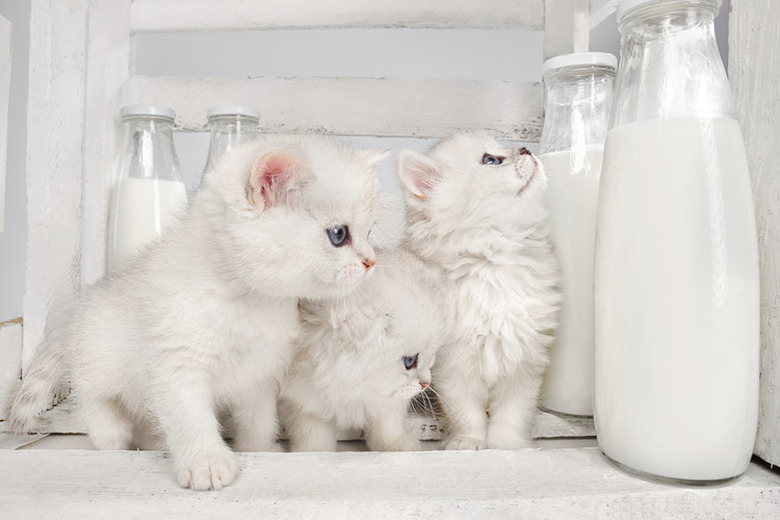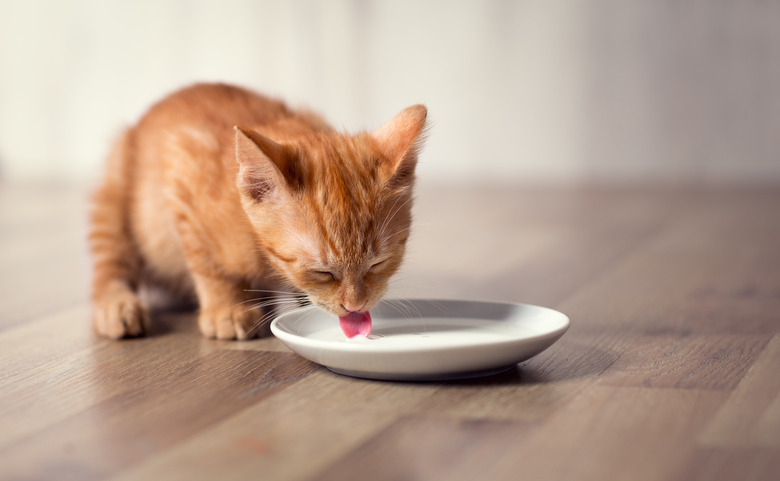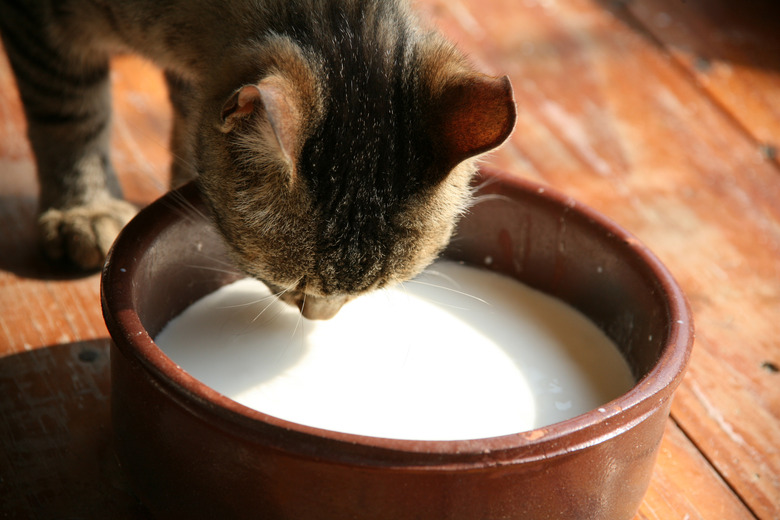Can Cats Drink Cows' Milk?
While there's a stereotype in cartoons and other entertainment of a cat or kitten drinking milk from a bowl, this creamy beverage is not the best choice for felines. So, can cats drink milk? Unless it's a formula designed specifically for kittens, milk — especially cows' milk — can cause intestinal irritation. It can be given in small amounts as an occasional treat, but it should not be a staple in their diet.
When cats are born, they need their mother's milk to survive and thrive. Once they wean, formula may be introduced, but after the early kitten stage, fresh water and canned or dry food formulated for cats is a sufficient level of nutrition, so adding milk to their diet is not necessary.
Can kittens drink cows' milk?
Can kittens drink cows' milk?
A kitten drinking milk from her mother will get crucial nutrients and antibodies to help her grow in the first few weeks of life, up to her 8th or 12th week. Their mother's milk will make up all their meals until that point, when they will gradually wean on their own or their mother has loss of milk supply. Kittens can now eat solid food and do not need milk of any kind at this point.
Things get more complicated if newborn kittens are found away from their mother or if their mother is sick or deceased. These young felines need the help of humans to survive and become more self-sufficient. If you find kittens in a nest who look healthy, leave them be and check back in a few hours, as their mother may be out hunting. If you watch them and she does not come back, you can step in and help. Taking them to the veterinarian is important, as the vet can help you figure out an estimated age and appropriate steps to take in fostering them.
If the kittens are too young for solid food, you will likely bottle feed them a kitten-safe formula that is free of lactose and meets all of their nutritional needs. They should not, however, be given standard cows' milk since it does not have the necessary vitamins to help them grow.
Lactose intolerance in cats
Lactose intolerance in cats
So, what about older felines? Can cats drink cows' milk when they are adults? They often express interest in cows' milk, but that does not mean it's something they should regularly consume. Aside from it being high in fat, cows' milk makes most felines sick. While it is not toxic, most cats are lactose intolerant and cannot digest the compounds of dairy. This rich beverage can cause them stomach cramps and diarrhea if consumed in excess, so it should be enjoyed sparingly.
Cats who eat a lot of dairy are also at an increased risk for obesity. Cows' milk and cheese have a high fat content at an amount cats do not need. They may also have sodium, which is unhealthy for cats. For these reasons, it's best to keep cats' dairy consumption minimal. If you want to share people food with your feline, some fruits and veggies are good for them, or you can offer cooked fish or eggs.
Why do cats love milk?
Why do cats love milk?
Just because they should not have milk does not mean that cats do not like it. Milk is a treat to cats, and they are drawn to dairy products because of their high fat and protein content. Like ice cream for humans, a little here and there will not hurt, but it should not be given regularly.
If your cat is constantly gravitating toward cows' milk or other dairy products, assess his diet. It may be deficient in certain areas. Your veterinarian can give him a physical to make sure he is at a healthy weight and will help you figure out the best food to help him get all of the nutrients he needs. If you want to spoil your cat, consider offering alternative treats, like things he can play with or sleep on. Instead of giving your cat milk, get him a special toy or a cozy bed.
References
- Pleasant Plains Animal Hospital: Kittens: When is it Okay to Separate Them from Their Mothers?
- Charlottesville Cat Care Clinic: Why Do Cats Love All Dairy Products?
- People's Dispensary for Sick Animals: Vet Q&A: Can Cats Drink Milk?
- Blue Valley Animal Hospital: My Cat Loves Cheese! Get The Facts About Cats And Cheese


